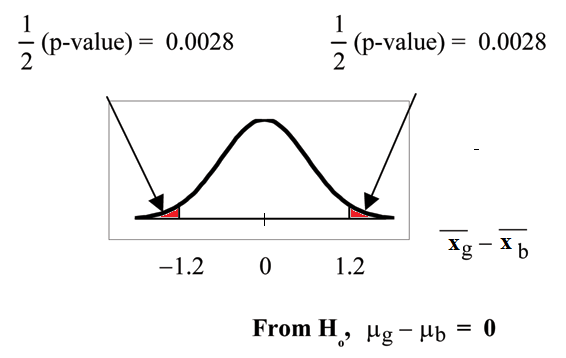| << Chapter < Page | Chapter >> Page > |
The comparison of two population means is very common. A difference between the two samples depends on both the means and the standard deviations. Verydifferent means can occur by chance if there is great variation among the individual samples. In order to account for the variation, we take the difference of the samplemeans, - , and divide by the standard error (shown below) in order to standardize the difference. The result is a t-score test statistic (shown below).
Because we do not know the population standard deviations, we estimate them using the two sample standard deviations from our independent samples. For thehypothesis test, we calculate the estimated standard deviation, or standard error , of the difference in sample means , - .
The test statistic (t-score) is calculated as follows:
The degrees of freedom (df) is a somewhat complicated calculation. However, a computer or calculator calculates it easily. The dfs are not always a whole number. The test statisticcalculated above is approximated by the student's-t distribution with dfs as follows:
When both sample sizes and are five or larger, the student's-t approximation is very good. Notice that the sample variances and are not pooled. (If the question comes up, do not pool the variances.)
The average amount of time boys and girls ages 7 through 11 spend playing sports each day is believed to be the same. Anexperiment is done, data is collected, resulting in the table below. Both populations have a normal distribution.
| Sample Size | Average Number of Hours Playing Sports Per Day | Sample Standard Deviation | |
|---|---|---|---|
| Girls | 9 | 2 hours | |
| Boys | 16 | 3.2 hours | 1.00 |
Is there a difference in the mean amount of time boys and girls ages 7 through 11 play sports each day? Test at the 5% level of significance.
The population standard deviations are not known. Let be the subscript for girls and be the subscript for boys. Then, is the population mean for girls and is the population mean for boys. This is a test of two independent groups , two population means .
Random variable : = difference in the sample mean amount of time girls and boys play sports each day.
:
:
The words "the same" tell you has an "=". Since there are no other words to indicate , then assume "is different." This is a two-tailed test.
Distribution for the test: Use where is calculated using the formula for independent groups, two population means. Using a calculator, is approximately 18.8462. Do not pool the variances.
Calculate the p-value using a student's-t distribution: p-value = 0.0054
Graph:

So,
Half the p-value is below -1.2 andhalf is above 1.2.
Make a decision: Since p-value, reject .
This means you reject . The means are different.
Conclusion: At the 5% level of significance, the sample data show there is sufficient evidence to conclude that the mean number of hours that girls and boys aged 7through 11 play sports per day is different (mean number of hours boys aged 7 through 11 play sports per day is greater than the mean number of hours played by girls OR the mean number of hours girls aged 7 through 11 play sports per day is greater than the mean number of hours played by boys).
STAT . Arrow over to
TESTS and press
4:2-SampTTest . Arrow over to Stats and press
ENTER . Arrow down
and enter
2 for the first sample mean,
for Sx1,
9 for n1,
3.2 for the
second sample mean,
1 for Sx2, and
16 for n2. Arrow down to μ1: and
arrow to
does not equal μ2. Press
ENTER . Arrow down to Pooled: and
No . Press
ENTER . Arrow down to
Calculate and press
ENTER . The
p-value is p = 0.0054, the dfs are approximately 18.8462, and the teststatistic is -3.14. Do the procedure again but instead of Calculate do Draw.A study is done by a community group in two neighboring colleges to determine which one graduates students with more math classes. College A samples11 graduates. Their average is 4 math classes with a standard deviation of 1.5 math classes. College B samples 9 graduates. Their average is 3.5 math classes with astandard deviation of 1 math class. The community group believes that a student who graduates from college A has taken more math classes, on the average. Both populations have a normal distribution. Test at a 1% significance level.Answer the following questions.
Is this a test of two means or two proportions?
two means
Are the populations standard deviations known or unknown?
unknown
Which distribution do you use to perform the test?
student's-t
What is the random variable?
What are the null and alternate hypothesis?
Is this test right, left, or two tailed?
right
What is the p-value?
0.1928
Do you reject or not reject the null hypothesis?
Do not reject.

Notification Switch
Would you like to follow the 'Quantitative information analysis iii' conversation and receive update notifications?